Updated 21 June 2025 at 10:55 IST
Trump Disavows Spy Chief Tulsi Gabbard’s Iran Nuclear Programme, Declares 'My Intelligence Community Is Wrong'
Trump rejects Tulsi Gabbard’s stance on Iran’s nuclear program, calling the intelligence "wrong" in a bold statement, escalating tensions surrounding the US-Iran nuclear discourse.
- World News
- 3 min read

US President Donald Trump publicly rejected the intelligence assessment about Iran's nuclear activities, directly criticizing his Director of National Intelligence, Tulsi Gabbard. Gabbard had previously stated that US intelligence agencies did not believe Iran was actively pursuing a nuclear weapon.
In response, Trump dismissed her statement, labeling it as incorrect and emphasizing his differing stance on the matter.
Donald Trump, speaking to reporters in New Jersey, addressed the controversy saying, "Then my intelligence community was wrong." Upon being informed that it was Gabbard who had made the statement, he swiftly added, "She's wrong."
Gabbard's comments, made earlier in March, suggested that US intelligence agencies believed Iran had "not made a decision to build a nuclear weapon." This direct contradiction between the President and his intelligence director has further escalated tensions regarding the issue.
Advertisement
Trump also raised concerns about Iran’s civilian nuclear energy ambitions, questioning why the country would pursue nuclear power when it holds one of the largest oil reserves in the world. He expressed disbelief, saying, “It’s hard to see why they would need civilian nuclear power if they have so much oil.”
Trump Discusses Military Action Against Iran
In addition to his comments on intelligence, Trump hinted at the possibility of military action against Iran. Specifically, he discussed the potential difficulty of attacking Iran’s well-defended Fordo uranium enrichment facility, which is buried deep beneath a mountain. Trump suggested it would be “very hard to stop” Israeli airstrikes on the facility, as they would likely involve advanced weapons capable of penetrating the facility’s underground bunkers.
Advertisement
The Fordo facility has long been a point of contention, with experts believing that it is out of reach for conventional airstrikes, and only powerful “bunker-buster” bombs, like those in the US arsenal, could penetrate the site.
Trump on NATO Defense Spending
In a separate matter, Trump also weighed in on NATO's proposed defense spending target. NATO members are expected to discuss a new pledge requiring each country to allocate 5% of its GDP toward defense spending. Trump, however, disagreed with this expectation, stating, “I don’t think we should, but I think they should,” referring to other NATO members.
He emphasized the longstanding US contributions to the alliance, criticizing Spain for its reluctance to meet the defense spending target. “They are a very low payer,” Trump added.
Published By : Navya Dubey
Published On: 21 June 2025 at 10:15 IST
